Federal Government
-
- Rebuilding the Presumption of Preemption Maritime Reporter, May 2013 #18
I propose that the Legislative, Executive, Judicial Branches of the federal government should cooperatively work toward the rebuilding of the presumption in favor of federal preemption with respect to all matters related to maritime commerce. I also propose that maritime stakeholders undertake measures to make this a reality.
The Constitution already allows for such preemption – and it has been implemented with regard to various issues over time, particularly in the early days of the Republic. The practice, though, has lacked uniformity and consistency, to the detriment of maritime commerce and the U.S. economy in general.
The Commerce Clause of the United States Constitution provides that Congress shall have the power to “regulate Commerce with foreign Nations, and among the several States, and with the Indian tribes.” The Supremacy Clause of the Constitution provides: “This Constitution, and the Laws of the United States which shall be made in pursuance thereof; and all treaties made, or which shall be made, under the authority of the United States, shall be the supreme law of the land; and the judges in every state shall be bound thereby, anything in the constitution or laws of any state to the contrary notwithstanding.” The Constitution also provides that the judicial power of the United States extends to, among other things, “all Cases of admiralty and maritime Jurisdiction.”
The federal government has frequently exercised its broad authority over interstate and foreign commerce and over maritime issues. Only the federal government assesses and collects customs duties. Only the federal government establishes and maintains lighthouses and other major maritime aids to navigation. Only the federal government issues licenses and documents to US merchant mariners. Only the federal government regulates the design and construction of merchant vessels. States are granted limited authority to license and regulate small commercial vessels, unless the vessel owner elects to register the vessel with the US Coast Guard. Otherwise, documentation of commercial vessels is exclusively assigned to the federal government. States are granted authority to regulate maritime pilotage in local waters, except for vessels eligible to engage in the coastwise trade (once again, a determination made by the federal government).
The principal area in which the federal government fails to exercise its preemptory rights is with regard to protection of the marine environment. In large measure, this is because some of the states jumped on the environmental regulation bandwagon while the federal government was still mulling over the issue. A prime example is ballast water management. The state of California and various others instituted ballast water management regimes even while the issue was being debated at IMO and in other fora. It took years for the IMO and the federal government to coalesce around procedures other than high seas ballast water exchange and the IMO measures have yet to come into force. Even though the ultimate approach adopted by the state of California is currently impossible to achieve, the state refuses to voluntarily accede to the federally approved methodology.
The Department of Defense saw these differences arising at an early stage. Working with the Environmental Protection Agency (EPA), it successfully urged Congress to enact an amendment to the Federal Water Pollution Control Act (FWPCA, also known as the Clean Water Act) that provides for development of uniform national discharge standards for vessels of the Armed Forces. The amendment specifically preempts state and local governments from adopting or enforcing their own discharge standards for covered vessels. The commercial sector should work to amend this statute so as to include merchant vessels.
Congress has successfully kept the states from regulating the commercial aviation industry. It is ironic that Congress has been less interested in protecting the commercial maritime sector from similar encroachments. A recent bill to preempt state regulation with regard to ballast water management failed to attract sufficient support in the Senate, even after adoption in the House of Representatives.
The state of California asserts authority to regulate fuel usage by ships up to 24 nautical miles off its coast. Since state waters only extend out to three nautical miles, this is clearly extra-territorial. Yet, the U.S. Department of Justice fails to vigorously defend the federal interests in this regard. If a coastal state can assert jurisdiction out to 24 miles, there seems to be no reason it couldn’t assert jurisdiction out to 200 miles.
The federal courts have a mixed history in addressing preemption in the maritime sector. In an early case decided by Supreme Court Justice Joseph Story while riding circuit, he stated: “The advantages resulting to the commerce and navigation of the United States, from a uniformity of rules and decisions in all maritime questions, authorize us to believe that national policy, as well as judicial logic, require the clause of the Constitution to be construed as to embrace all maritime contracts, torts, and injuries, or, in other words, to embrace all those causes which originally and inherently belonged to the admiralty before any statutable restriction.” DeLovio v. Boit, 7 Fed.Cas. 418 (C.C.D.Mass. 1815). That case concerned whether a contract for marine insurance was controlled by state law or federal law. Justice Story emphatically ruled in favor of federal admiralty and maritime jurisdiction.
The issue of the extent of the federal power over foreign and interstate commerce as applied to maritime navigation reached the U.S. Supreme Court several years later. The state of New York had granted exclusive rights for the operation of mechanically-powered ships in its waters to the company founded by Robert Fulton. A competing company brought suit. After losing in New York state court, the competitor appealed to the US Supreme Court. In striking down the state decision, the court stated in pertinent part: “If, as has always been understood, the sovereignty of Congress, though limited to specified objects, is plenary as to those objects, the power over commerce with foreign nations and among the several states is vested in Congress as absolutely as it would be in a single government, having in its constitution the same restrictions on the exercise of the power as are found in the Constitution of the United States.” Gibbons v. Ogden, 22 U.S. 1 (1824).
In 1959, the Supreme Court struck down an Illinois statute that required certain rear fender mudguards on trucks and trailers operated on its highways as constituting an unreasonable burden on interstate commerce. Yet in 1960, it upheld the Detroit Smoke Abatement Code as applied to a ship engaged in interstate commerce while docked at a pier within the city. In the latter case, the court ruled that the Detroit code was an even-handed exercise of police power in an area where the federal government had not exercised its authority. Where the federal government has pervasively exercised its authority with respect to the design, construction, and operation of commercial vessels, the court has ruled that the concept of field preemption applies – that the federal government has adopted such a body of regulation that there is no room left for states to exercise any authority. It can reasonably be asserted that the federal government has now established an extensive and detailed body of law with regard to marine environmental protection. Whatever gaps may have existed previously have now been closed. State regulation of maritime commerce should be the exception, rather than the rule, and it should be clearly and carefully circumscribed. As noted above, the federal government could adopt, if it so chose, a field preemption approach with regard to marine environmental protection matters and elsewhere. There has though, at least to date, been insufficient pressure on the legislative, executive, and judicial branches to adopt such a position. I contend that the time has come. I do not advocate that the marine industry should be unregulated, or even under-regulated. Rather, I contend that Justice Story was right when, almost 200 years ago, he advocated uniformity in the regulation of the maritime industry. Federal uniformity has been allowed to erode over time. The rebuilding effort must begin now.
Dennis L. Bryant,
Maritime Regulatroy
Consulting, Gainsville, FL
t: 352-692-5493
e: [email protected](As published in the May 2013 edition of Maritime Reporter & Engineering News - www.marinelink.com)
-
- Oil Spill Response: Responder Immunity Analyzed Maritime Reporter, Mar 2016 #12
Court for the Eastern District of Louisiana granted summary judgment in favor of the various commercial oil spill response companies involved in the federal government’s response to the Deepwater Horizon (DWH) oil spill in the Gulf of Mexico in 2010. The responders had been sued by numerous individuals claiming
-
- The Federal Government’s 2020 Inland Impact Marine News, Feb 2020 #22
It is often difficult to push through the federal government morass to focus on the issues that actually matter to the inland operator. While 2020 inevitably will be a contentious year in American politics, it is critical to stay focused on the items that will have direct impact on the U.S. maritime industry.
-
- A New Approach To Issue Advocacy Maritime Reporter, Mar 1991 #21
. AWO tries to pursue its advocacy with the federal government with that vision and perspective in mind. A modern outreach program to the federal government—the Congress and the Executive Branch— must be grounded by an overriding principle of honesty and integrity in an association's work. Credibility
-
- FAIRNESS, SIMPLICITY AND ECONOMIC GROWTH Maritime Reporter, Feb 15, 1985 #37
unequivocal— is that the treatment that the various segments of the transportation community receive, and have come to expect, from the federal government is neither fair, simple nor conducive to the promotion of economic growth. There is no debating that fact. Consider the case of the airline indus
-
- The Angel Of Competition Maritime Reporter, Nov 1984 #34
in this job of president of the American Waterways Operators, Inc., working late one night, I grew increasingly angry as I contemplated the federal government's initiatives to confiscate ever larger user taxes from our depressed industry. How could they do that, I wondered. And then the light dawned:
-
- Dredging: Managing the Impact of Channel Deepening and Widening on Surrounding Structures Maritime Reporter, Mar 2020 #24
, it typically decreases the time needed to get the project designed and constructed because there are less procedures and requirements. If the federal government is involved, the minimum standard for deep draft navigation projects is divided into 75% federal and 25% non-federal funding. For most cases
-
- Farrell Calls For Presidential C o m m i t m e nt To The U.S. M a r i t i m e Industry Maritime Reporter, Dec 1987 #6
, absence of maritime focus in the Congress, federal regulatory excess, and the lack of consensus on maritime policy that is evident in both the federal government, and within the industry itself. However, he emphasized that the lack of Presidential leadership over many years has been the chief cause of
-
- CANADIAN SHIPBUILDING — 1985 — Maritime Reporter, Jun 1985 #76
shipbuilding, ship repairing and allied industries are at the crossroads. Policies must be implemented to strengthen our industry. A new federal government was elected last September that promised changes in policy to revitalize the shipbuilding, ship repairing and allied industries. The Progressive
-
- MarAd And EPA Propose Incinerator Ships For Hazardous Wastes Maritime Reporter, Dec 1980 #52
less than half as costly as land-based incineration. EPA and MarAd have established an Interagency Review Board to coordinate and expedite all Federal Government activities related to legislation, funding, further environmental evaluation, design, construction, per- mits, and operation of U.S.-flag chemica
-
- Insights: Outgoing Transportation Sec. Connaughton Marine News, Feb 2014 #12
audits, reducing personnel and promoting sponsorships. Virginia’s legislation is precedent setting and considered a model for other states and the federal government. One aspect of what sets you apart from other maritime professionals – in our mind – is your attention to the entire intermodal equation and
-
- Oil Spill Clean Up: Your Response is Required Marine News, Apr 2014 #22
potential is always out there, it is important to have a plan and know how to respond as soon as you are notified that a spill has occurred. The federal government has developed a plan for responding to spill incidents and it is important to know how to notify the government, and just as importantly, how
-
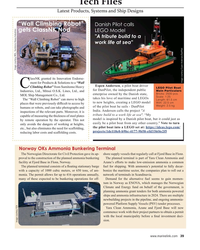 )
April 2024 - Maritime Reporter and Engineering News page: 39
)
April 2024 - Maritime Reporter and Engineering News page: 39Tech Files Latest Products, Systems and Ship Designs “Wall Climbing Robot” Danish Pilot calls gets ClassNK Nod LEGO Model "A tribute build to a work life at sea" Image courtesy MOL, Sumitomo Heavy Industries lassNK granted its Innovation Endorse- Image courtesy Espen Andersen/DanPilot ment for
-
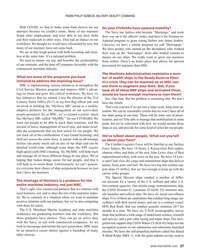 )
April 2024 - Maritime Reporter and Engineering News page: 27
)
April 2024 - Maritime Reporter and Engineering News page: 27RADM PHILIP SOBECK, MILITARY SEALIFT COMMAND With COVID, we had to make some hard choices for our Do your CIVMARs have upward mobility? mariners because we couldn’t rotate. Many of our mariners The Navy has Sailors who become “Mustangs,” and work found other employment, and were able to use their skills
-
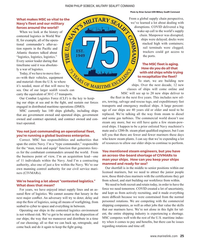 )
April 2024 - Maritime Reporter and Engineering News page: 25
)
April 2024 - Maritime Reporter and Engineering News page: 25RADM PHILIP SOBECK, MILITARY SEALIFT COMMAND Photo by Brian Suriani USN Military Sealift Command From a global supply chain perspective, What makes MSC so vital to the we’ve learned a lot about dealing with Navy’s ? eet and our military disruptions. COVID delivered a big forces around the world? wake-up
-
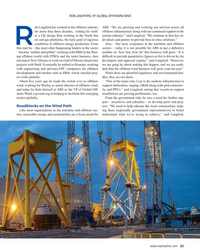 )
April 2024 - Maritime Reporter and Engineering News page: 21
)
April 2024 - Maritime Reporter and Engineering News page: 21ROB LANGFORD, VP, GLOBAL OFFSHORE WIND ob Langford has worked in the offshore industry ABS. “We are growing and evolving our services across all for more than three decades, ‘cutting his teeth’ offshore infrastructure along with our continued support to the in a UK design ? rm working in the North Sea
-
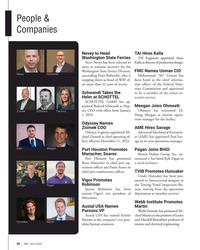 )
April 2024 - Marine News page: 42
)
April 2024 - Marine News page: 42is Mohammad “Ali” Usman has stepping down as head of WSF af- been hired as the chief informa- ter more than 33 years of service. tion of? cer of the Federal Mari- time Commission and appointed Schwandt Takes the to be a member of the senior ex- Helm at SCHOTTEL ecutive service. SCHOTTEL GmbH has ap- pointed
-
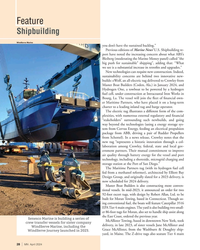 )
April 2024 - Marine News page: 28
)
April 2024 - Marine News page: 28Propellers from Schottel). In a news release, Crowley notes that the new tug “represents a historic innovation through a col- laboration among Crowley, federal, state and local gov- ernment partners. Their mutual commitment to improve air quality through battery energy for the vessel and port technology
-
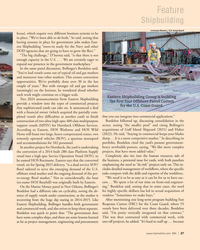 )
April 2024 - Marine News page: 27
)
April 2024 - Marine News page: 27Feature Shipbuilding Loumania Stewart / U.S. Coast Guard focus), which require very different business systems to be in place. “We’ve been able to do both,” he said, noting that having systems in place for government jobs makes East- ern Shipbuilding “move-in ready for the Navy and other DOD agencies
-
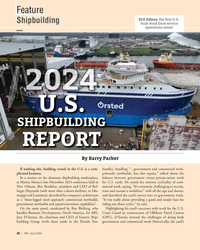 )
April 2024 - Marine News page: 26
)
April 2024 - Marine News page: 26Feature ECO Edison, the ? rst U.S.- Shipbuilding built wind farm service operations vessel. Ørsted U.S. SHIPBUILDING REPORT By Barry Parker If nothing else, building vessels in the U.S. is a com- handle), handling “…government and commercial work, plicated business. primarily newbuilds, but also
-
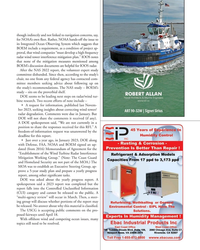 )
April 2024 - Marine News page: 25
)
April 2024 - Marine News page: 25for IOOS radar. After the NAS 2022 report, the volunteer expert study committee disbanded. Since then, according to the study’s chair, no one from any federal agency has contacted com- mittee members seeking advice about following up on the study’s recommendations. The NAS study – BOEM’s study – sits on
-
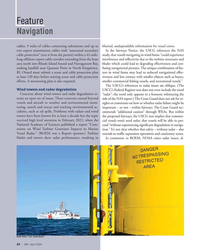 )
April 2024 - Marine News page: 24
)
April 2024 - Marine News page: 24commercial ? shing vessels, and recreational vessels.” The USCG’s references to radar issues are oblique. (The Wind towers and radar degradation USCG’s Federal Register text does not even include the word Concerns about wind towers and radar degradation re- “radar”; the word only appears in a footnote referencing
-
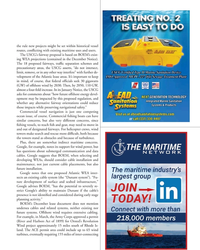 )
April 2024 - Marine News page: 23
)
April 2024 - Marine News page: 23, limit, remove, or in any other way interfere” with further de- velopment of the Atlantic lease areas. It’s important to keep in mind, of course, that federal of? cials seek 30 gigawatts (GW) of offshore wind by 2030. Then, by 2050, 110 GW, almost a four-fold increase. In its January Notice, the USCG
-
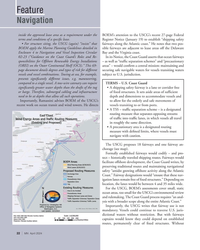 )
April 2024 - Marine News page: 22
)
April 2024 - Marine News page: 22Feature Navigation inside the approved lease area as a requirement under the BOEM’s attention to the USCG’s recent 27-page Federal terms and conditions of a speci? c lease. Register Notice (January 19) to establish “shipping safety • For structure siting, the USCG (again) “insists” that fairways along
-
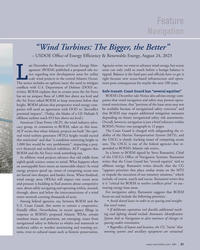 )
April 2024 - Marine News page: 21
)
April 2024 - Marine News page: 21, and this restriction” and that “a condition restricting height to the USCG is closely tracking issues of competing ocean uses. The USCG is one of the federal agencies that re- 1,000 feet would be very problematic”, impacting a proj- ect’s ? nancial and technical viabilities. ACP suggests that sponded
-
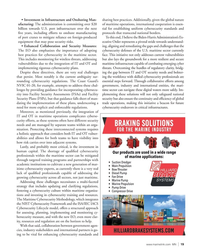 )
April 2024 - Marine News page: 19
)
April 2024 - Marine News page: 19• Investment in Infrastructure and Onshoring Man- sharing best practices. Additionally, given the global nature ufacturing: The administration is committing over $20 of maritime operations, international cooperation is essen- billion towards U.S. port infrastructure over the next tial for establishing
-
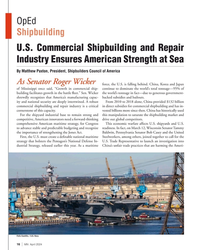 )
April 2024 - Marine News page: 16
)
April 2024 - Marine News page: 16OpEd Shipbuilding U.S. Commercial Shipbuilding and Repair Industry Ensures American Strength at Sea By Matthew Paxton, President, Shipbuilders Council of America As Senator Roger Wicker force, the U.S. is falling behind. China, Korea and Japan of Mississippi once said, “Growth in commercial ship-
-
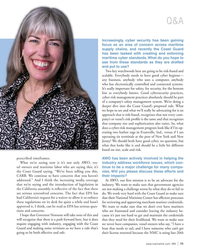 )
April 2024 - Marine News page: 11
)
April 2024 - Marine News page: 11Q&A Increasingly, cyber security has been gaining focus as an area of concern across maritime supply chains, and recently the Coast Guard has been tasked with creating and enforcing maritime cyber standards. What do you hope to see from these standards as they are drafted and put to use? Two key
-
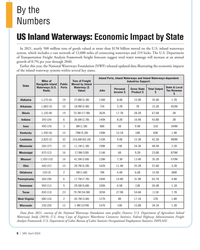 )
April 2024 - Marine News page: 8
)
April 2024 - Marine News page: 8state pro? les (Sources: U.S. Department of Agriculture Inland Waterways Study (2019); U.S. Army Corps of Engineers Waterborne Commerce Statistics; Federal Highway Administration Freight Analysis Framework; U.S. Department of Labor Bureau of Labor Statistics Occupational Employment Statistics; IMPLAN) 8
-
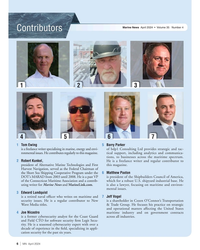 )
April 2024 - Marine News page: 6
)
April 2024 - Marine News page: 6is a freelance writer and regular contributor to president of Alternative Marine Technologies and First this magazine. Harvest Navigation, served as the Federal Chairman of the Short Sea Shipping Cooperative Program under the 6 Matthew Paxton DOT’s MARAD from 2003 until 2008. He is a past VP is president
-
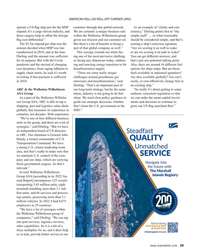 )
February 2024 - Maritime Reporter and Engineering News page: 29
)
February 2024 - Maritime Reporter and Engineering News page: 29AMERICAN ROLL-ON ROLL-OFF CARRIER (ARC) operate a US ? ag ship just for the MSP customer through that global network. As an example of “clarity and con- stipend. It’s a cargo driven industry, and We are certainly a unique business unit sistency,” Ebeling points ? rst to “the those cargoes help to
-
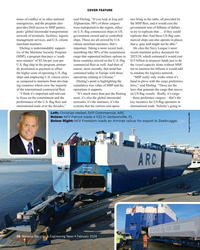 )
February 2024 - Maritime Reporter and Engineering News page: 28
)
February 2024 - Maritime Reporter and Engineering News page: 28COVER FEATURE times of con? ict or in other national said Ebeling. “If you look at Iraq and tors bring to the table, all provided by emergencies, and the program also Afghanistan, 98% of those cargoes the MSP ? eet, and it would cost the provides DoD access to MSP partici- were transported to the
-
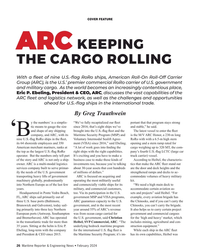 )
February 2024 - Maritime Reporter and Engineering News page: 26
)
February 2024 - Maritime Reporter and Engineering News page: 26COVER FEATURE ARC KEEPING THE CARGO ROLLING With a ? eet of nine U.S.-? ag RoRo ships, American Roll-On Roll-Off Carrier Group (ARC), is the U.S.’ premier commercial RoRo carrier of U.S. government and military cargo. As the world becomes an increasingly contentious place, Eric P. Ebeling, President
-
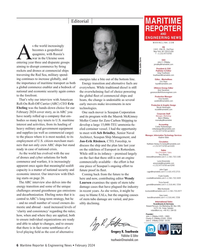 )
February 2024 - Maritime Reporter and Engineering News page: 6
)
February 2024 - Maritime Reporter and Engineering News page: 6Editorial MARITIME REPORTER AND ENGINEERING NEWS M A R I N E L I N K . C O M s the world increasingly HQ 118 E. 25th St., 2nd Floor becomes a geopolitical New York, NY 10010 USA T +1.212.477.6700 quagmire, with Russia’s Awar in the Ukraine soon CEO John C. O’Malley entering year three and disparate
-
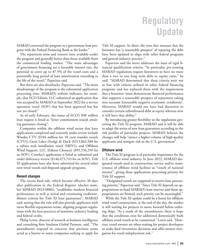 )
February 2024 - Marine News page: 33
)
February 2024 - Marine News page: 33Regulatory Update MARAD converted the program to a government loan pro- Title XI support. In short, the tests that measure that the gram with the Federal Financing Bank as the lender.” borrower has ‘a reasonable prospect’ of repaying the debt The repayment term and interest rates available under have
-
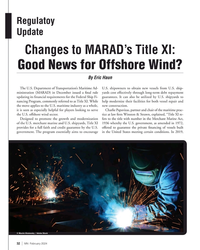 )
February 2024 - Marine News page: 32
)
February 2024 - Marine News page: 32(MARAD) in December issued a ? nal rule yards cost effectively through long-term debt repayment updating its ? nancial requirements for the Federal Ship Fi- guarantees. It can also be utilized by U.S. shipyards to nancing Program, commonly referred to as Title XI. While help modernize their
